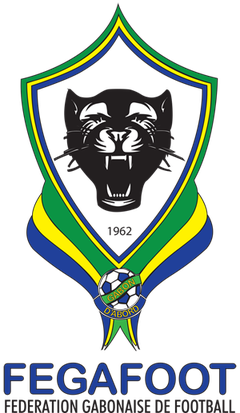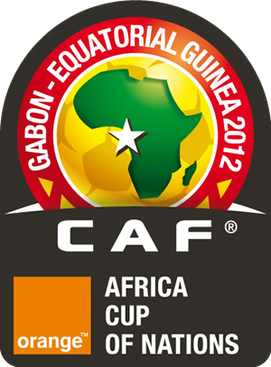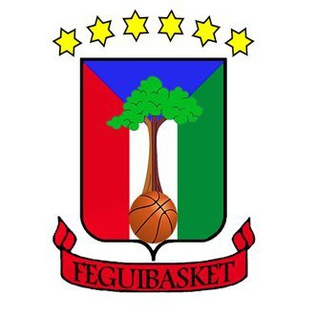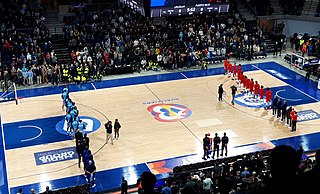
The Gabon national football team represents Gabon in men's international football. The team's nickname is The Panthers and it is governed by the Gabonese Football Federation. They have never qualified for the FIFA World Cup, but have qualified eight times for the Africa Cup of Nations. Gabon is a member of both FIFA and Confederation of African Football (CAF).

The Central African Republic national football team, nicknamed Les Fauves, is the national team of the Central African Republic and is controlled by the Central African Football Federation. They are a member of CAF. Despite being traditionally one of the weakest teams in Africa and the world, they recently achieved success. They won the 2009 CEMAC Cup by beating Gabon in the semi-finals and Equatorial Guinea in the final 3–0. Their FIFA ranking rose from 202nd in August 2010 to 89th by July 2011. On 10 October 2010, they earned a shock 2012 Africa Cup of Nations qualifier win at home against Algeria 2–0, which put them top of their qualification group. The team won its first FIFA World Cup qualifier on 2 June 2012 after beating Botswana 2–0 at home.

The individual member states of the African Union (AU) coordinate foreign policy through this agency, in addition to conducting their own international relations on a state-by-state basis. The AU represents the interests of African peoples at large in intergovernmental organizations (IGO's); for instance, it is a permanent observer at the United Nations' General Assembly.

The 2012 Africa Cup of Nations, also known as the Orange Africa Cup of Nations for sponsorship reasons, was the 28th edition of the Africa Cup of Nations, the football championship of Africa organized by the Confederation of African Football (CAF).
The FIBA Africa Championship 2009 Qualification occurred on various dates between 4 August 2008 and 31 May 2009. It was used to determine which African national basketball teams would qualify for the FIBA Africa Championship 2009. Teams competed with other teams in their respective "zones" for a spot in the Championship tournament.
The FIBA Africa Championship 2011 Qualification took place on various dates between 11 August 2010 and mid-2011. It was used to determine which African national basketball teams would qualify for the FIBA Africa Championship 2011. Teams competed with other teams in their respective "zones" for a spot in the Championship tournament.
AfroBasket 2015Qualification occurred on various dates between 21 September 2014 and 8 March 2015. It was used to determine which African national basketball teams would qualify for the 2015 FIBA Africa Championship. Teams competed with other teams in their respective "zones" for a spot in the Championship tournament.

The 2017 FIBA Women's AfroBasket was the 23rd AfroBasket Women, played under the rules of FIBA, the world governing body for basketball, and FIBA Africa. The tournament was hosted by Mali from 18 to 27 August, with games played at Bamako. The winners and runners-up qualified for the 2018 FIBA Women's Basketball World Cup.
AfroBasket 2017 qualification occurred on various dates on 2017. It determined which African national basketball teams qualified for the 2017 FIBA Africa Championship. Teams competed with other teams in their respective "zones" for a spot in the Championship tournament.

The Equatorial Guinea national basketball team is the national basketball team from Equatorial Guinea. It has yet to appear at the FIBA World Championship or the FIBA Africa Championship.
The 2019 FIBA Basketball World Cup qualification for the FIBA Africa region, began in November 2017 and concluded in February 2019. The process determined the five African teams that would participate at the 2019 FIBA World Cup.

The 2023 FIBA Basketball World Cup qualification process determined 30 of the 32 teams that qualified for the 2023 FIBA Basketball World Cup. As co-hosts, the Philippines and Japan each got an automatic qualification for the tournament when they were awarded the joint hosting rights along with co-host Indonesia.

FIBA AfroBasket 2021 was the 30th edition of the FIBA AfroBasket, a men's basketball continental championship of Africa. The tournament was hosted by Rwanda for the first time. It was originally scheduled to take place between 17 and 29 August 2021, but it was moved back a week due to the COVID-19 pandemic, to 24 August to 5 September 2021.

The AfroBasket 2021 qualification was a basketball competition that was played from January 2020 to July 2021, to determine the fifteen FIBA Africa nations who would join the automatically qualified host Rwanda at the AfroBasket 2021 final tournament.
The 2023 FIBA Basketball World Cup qualification for the FIBA Africa region, began in November 2021 and concluded in February 2023. The process determined the five African teams that would participate at the 2023 FIBA World Cup.
The 2021 Women's Afrobasket qualification occurred on various dates on 2021 to determine which African national basketball teams would qualify for the 2021 Women's Afrobasket. Teams compete with other teams in their respective "zones" for a spot in the championship tournament.

This is a list of the Angola national football team results from 2000 to 2019.
The 2023 Women's Afrobasket qualification will be played on various dates in 2023 to determine the seven teams who qualify for the 2023 Women's Afrobasket. Teams compete with other teams in their respective "zones" for a spot in the championship tournament. There are seven zones in total.
The 2023 FIBA AfroCan will be the 2nd edition of the FIBA AfroCan. The tournament will be held from 8 July to 16 July 2023 and will be hosted in Angola. DR Congo are the defending champions, having won the 2019 title. The second tournament was supposed to be held in 2021, but was cancelled due to the COVID-19 pandemic.









